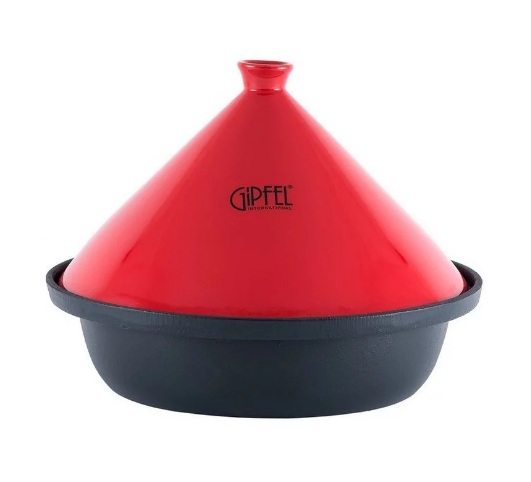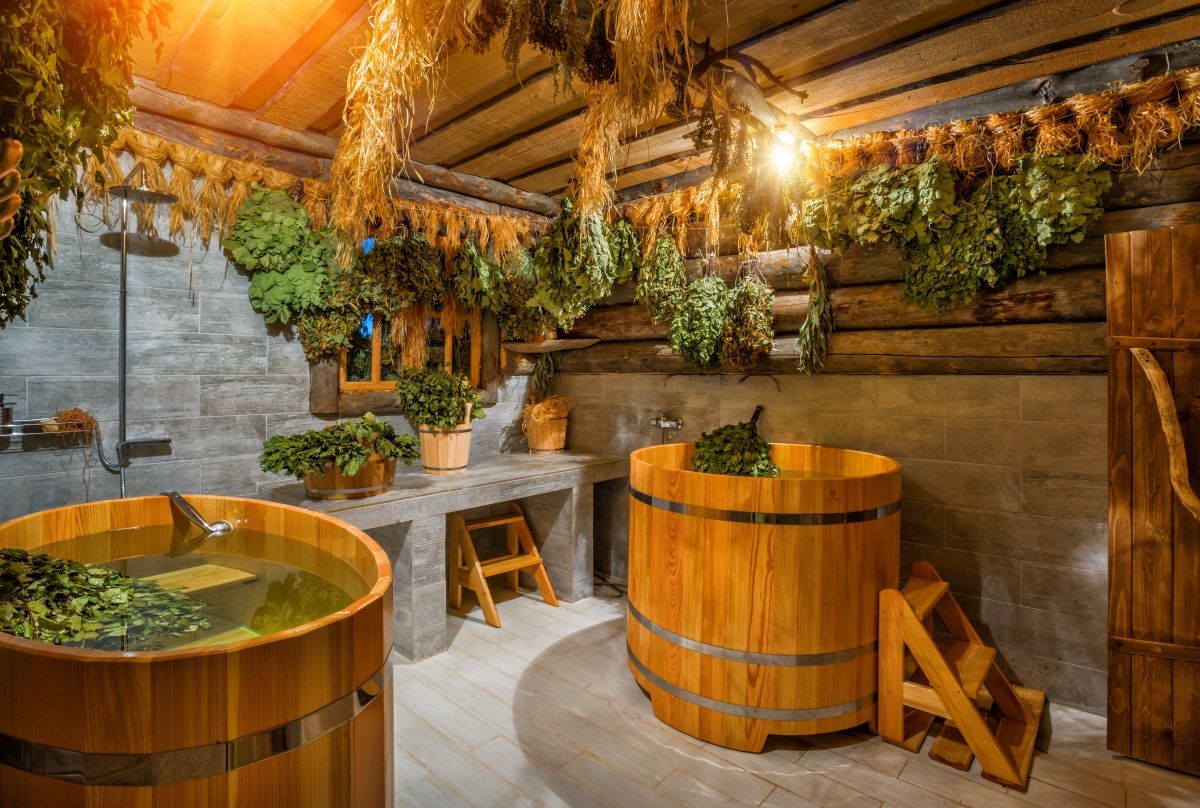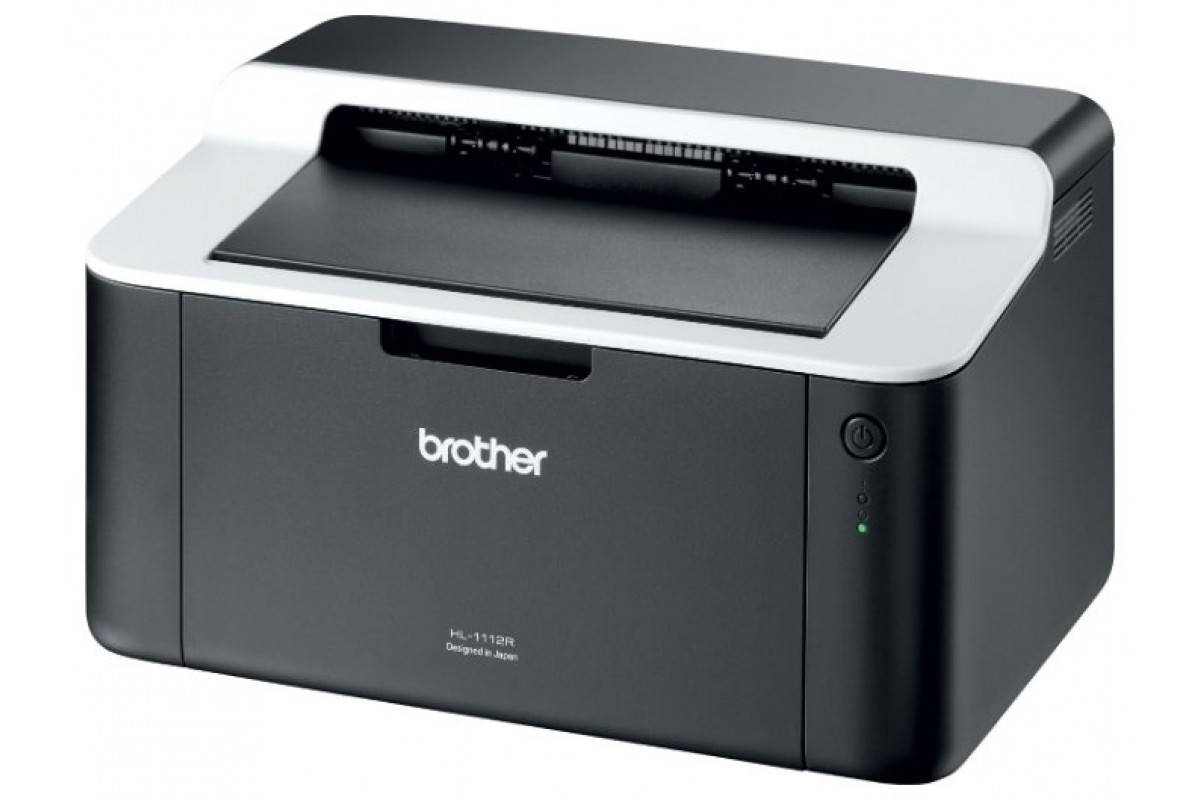Rating of the best tagines for 2020
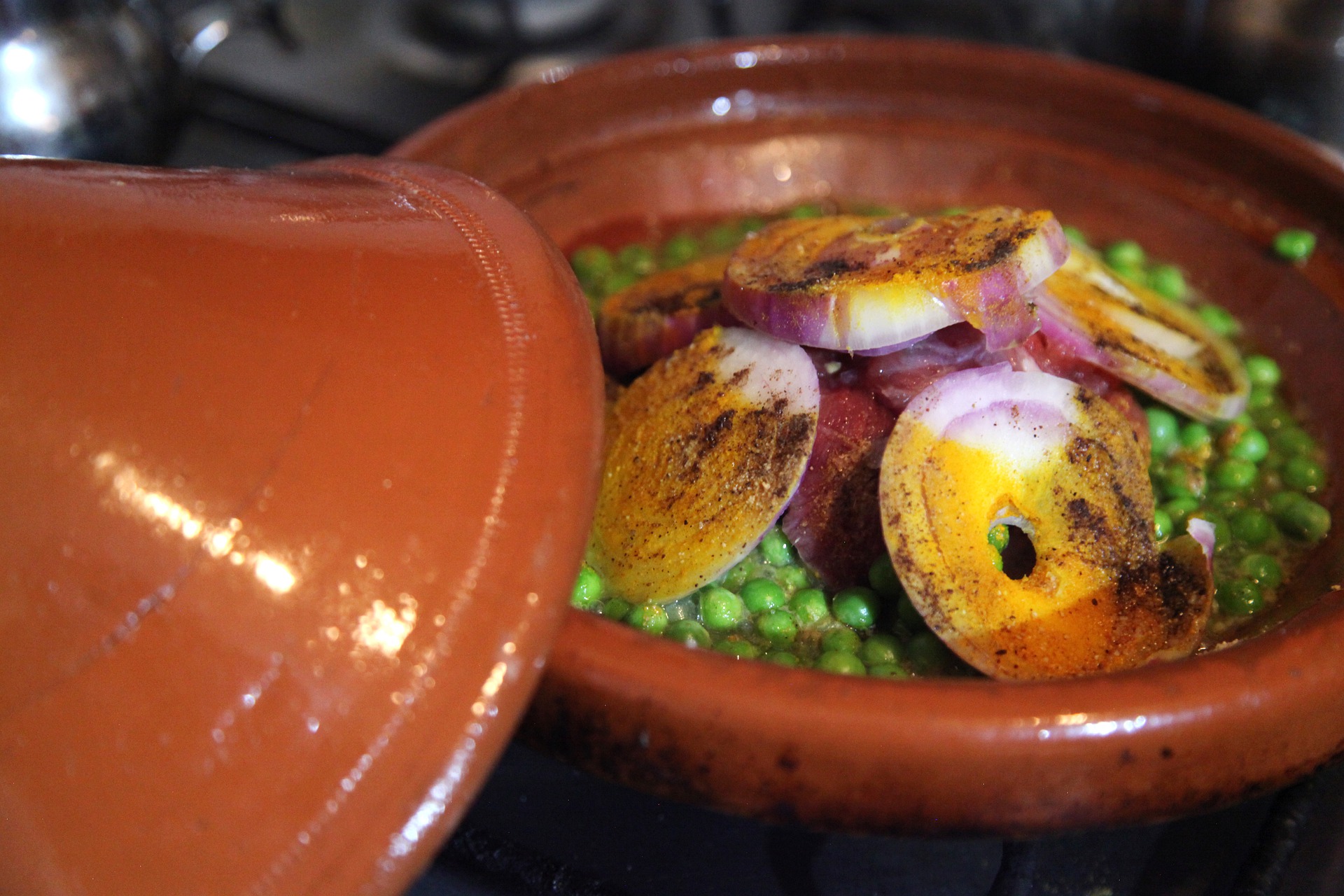
The days of using food solely for natural needs are a thing of the past. Contemporary culinary and culinary arts include a wide variety of traditional cuisine from around the world and highly professional self-expression. The enjoyment of taste becomes a daily human need. Never before has the variety of dishes brought from all continents and countries been so abundant, and most importantly - skillfully and competently reproduced in accordance with the "original source". National culinary traditions also include special cutlery and kitchen utensils.
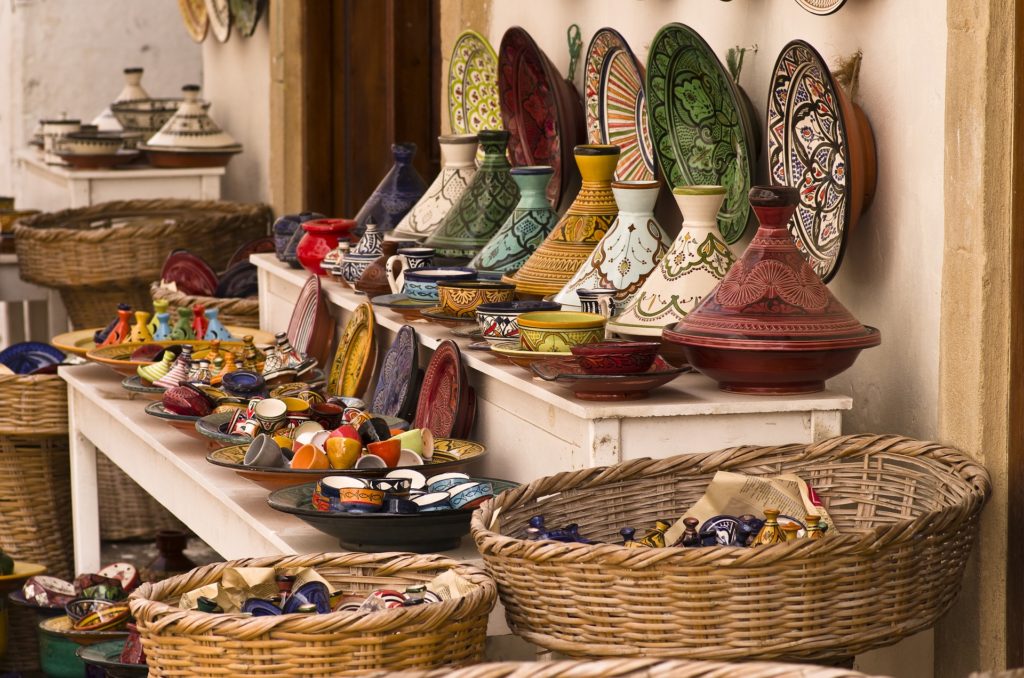
Tazhin
The type of kitchenware, also called tajin, is a type of saucepan, but with one distinctive feature - a high cone-shaped lid. Let's figure out what it is for and how it differs from the pan.
The massive bottom and sides are designed for continuous cooking in its own steam, which is collected under the lid. The steam condenses and flows down the walls in the form of juice, again entering the languishing process, eventually turning into a sauce.
The birthplace of tagine can be considered Morocco, followed by Egypt and African countries. Since ancient times, hot coals have served as a hearth for cooking. The lack of water resources affected food preparation, so heat-resistant and moisture-saving vessels were needed.
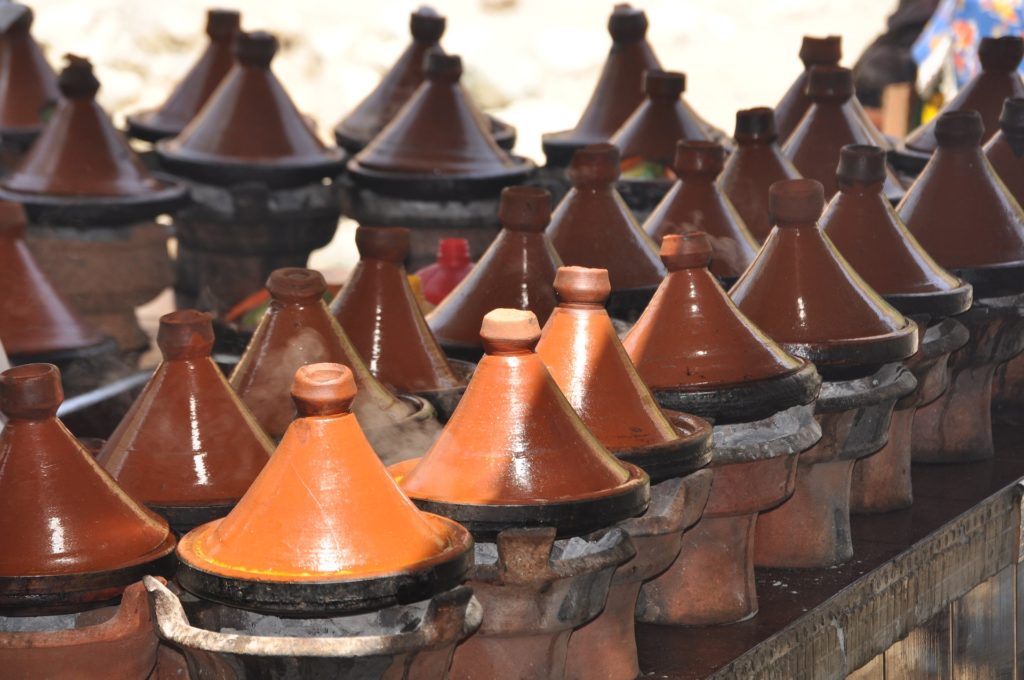
Ingredients
The idea of mixing the main product - meat, poultry or fish with vegetables, lemon, spices and herbs - for a long time allows the dish to deeply absorb the aromas and mix into a single flavor bouquet.
Cooking time
The versatile tajin makes lamb juicy and soft when stewed all day long. Fish and chicken dishes take several hours.
Vegetables, fresh fruits, dried fruits and herbs are added towards the end of the cooking process. Vegetarian preparations are quick and juicy.
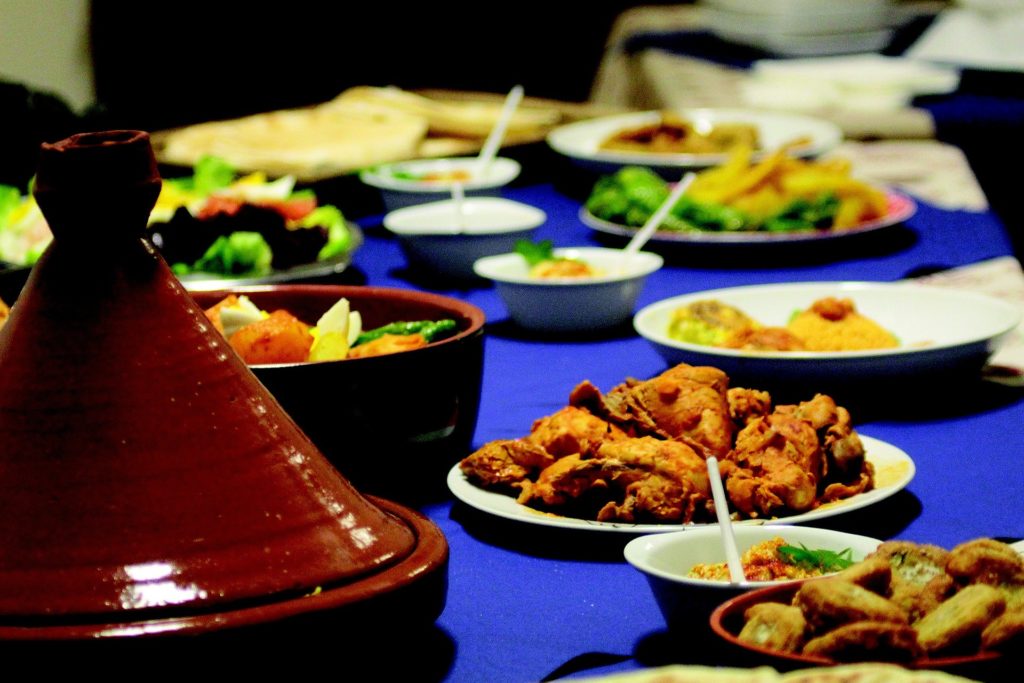
Most often, tajin is prepared:
- fish with vegetables and spices;
- duck with apples, fruits or vegetables;
- chicken with component variations;
- lamb with couscous or vegetable garnishes.
Simmering food makes the most of the food's own moisture in order to preserve its beneficial properties.
How to choose tajin
At the first stage, you should decide on the method and cooking conditions.
Material
Depending on the aggressiveness of the heating medium, cast iron, ceramic or stainless steel tagine are chosen.
The versatility of the cast-iron version determines the frequency of its choice, however, unlike the ceramic version, it is impossible to store a finished dish in a cast-iron dish.
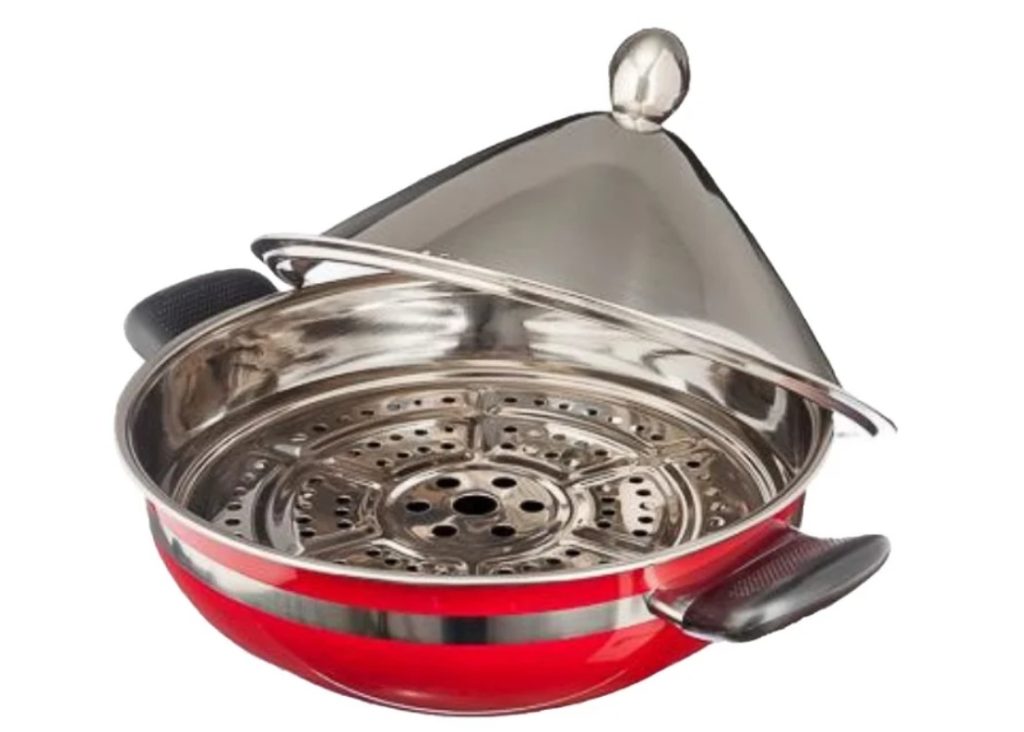
Cast iron cookware should be protected from corrosion and rust, which requires additional care for drying after washing and lubricating the inner walls with oil.
Size and proportion
The height of the conical lid should be approximately equal to the diameter of the base bowl.
Chefs use containers with a diameter of 50 cm. For a family of four, a size of 27-35 cm is suitable. They are the most popular. For individual paired feasts, 20-25 cm dishes are enough.
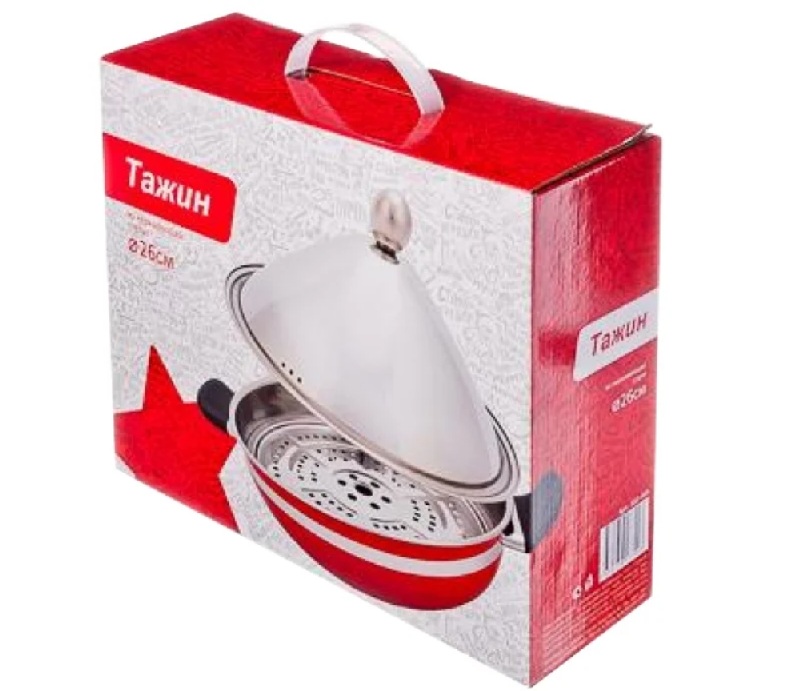
The cost
"Representatives" of branded brands cost several tens of thousands of rubles, but the quality of such dishes is excellent.
Budget options do not exceed 3000 rubles in price. It is important that the model does not turn out to be decorative, that is, unsuitable for cooking.
In the interval between the maximum and minimum prices, there are numerous options with good quality from unknown manufacturers or delivered to the stream of average quality tags.
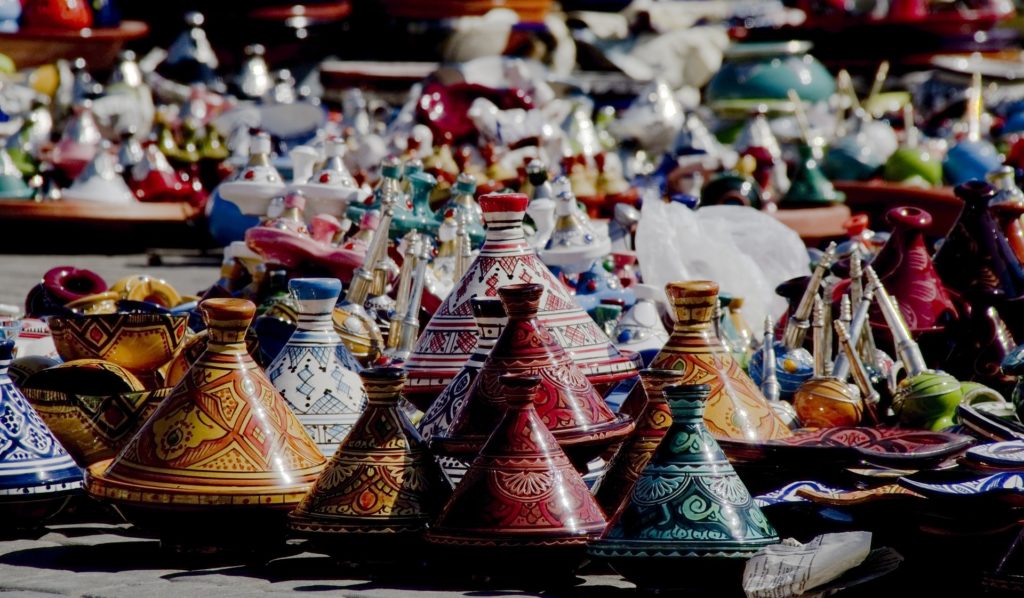
Selection errors
Not always a beautiful and bright color component speaks of decent quality.
A special manufacturing process requires certain costs for technological steps and good materials. In the case of the purchase of tagine, reliability criteria should be adhered to, which may require slightly increased costs. Otherwise, the chosen option may be just another frying pan in the kitchen.
Rating of the best tagines
Ceramic
Emile henry
The French brand offers customers ceramic tableware that has been handcrafted in Burgundy for 165 years. Initially, ceramics were made by potters in the workshop, but gradually the volumes grew and the quality made such products popular not only in France, but also in Europe. Currently, 50 countries around the world appreciate and gladly purchase Emile Henry. The dishes are made only from natural materials that do not contain nickel, cadmium and lead.
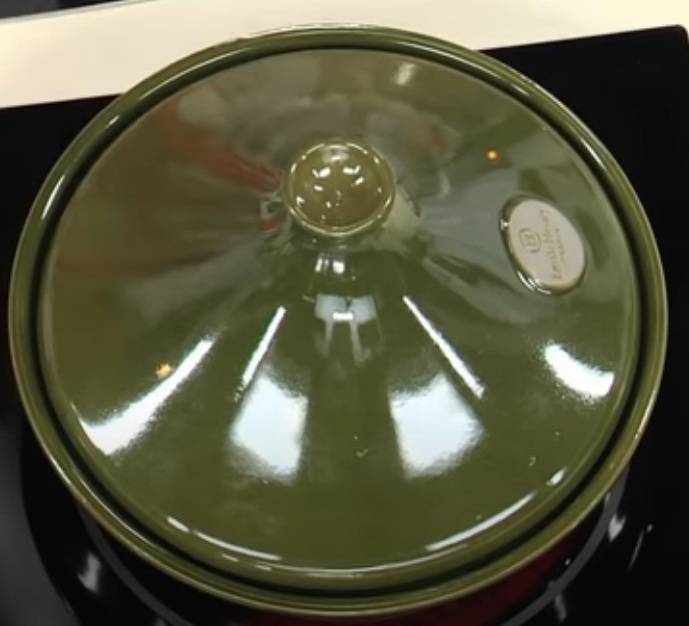
The volume of Emile Henry is 2 liters.
The conical lid repeatedly condenses the steam from the food being cooked, then goes down and soaks the contents of the tagine.
- suitable for professional kitchen;
- there are options for 4, 3 and 3.5 liters;
- available in basalt, basil and pomegranate colors;
- 5-6 servings are allowed;
- dishwasher safe;
- environmentally friendly;
- dishes have a rich and aromatic taste;
- use on the stove and in the oven is allowed.
- not identified.
Emile Henry Delight 4 liters
The material for the manufacture of the models of this company was innovative ceramics, which made it possible to make the shape of the tagines lighter.

- belongs to the class of utensils for healthy cooking;
- there are modifications for 2 and 3.3 liters;
- maximum preservation of nutrients of the products used;
- the presence of natural non-stick glaze for quick cleaning;
- long warranty - 5 years;
- manual production;
- ceramics of the latest technologies are compatible with various types of thermal heating;
- suitable for cooking in a microwave oven;
- heats up quickly and holds the temperature for a long time when removed from the heating source;
- no cracks form at high heat without content;
- easily perceives a wide range of abrupt temperature changes;
- the presence of non-stick properties;
- does not absorb odors;
- does not fade;
- matches with metal accessories;
- stylish design allows you to serve with a beautiful setting.
- absent.
Tajines Classic Regas
Handcrafted for gourmets and quality connoisseurs, this Spanish tajine is made in Spain.

- production material - environmentally friendly natural clay;
- durable enamel coating;
- non-stick effect;
- suitable for ovens, halogen, gas and electric stoves, as well as glass ceramics;
- you can bake bread;
- pleasant terracotta color;
- optimal diameter (28 cm).
- not detected.
Pomi d'Oro
Cookware from a Chinese manufacturer has a 1 year warranty.

- low price;
- made of stoneware;
- Can be washed in the dishwasher;
- suitable for use in ovens and microwaves;
- Beautiful design;
- environmentally friendly production.
- absent.
Esprit de cuisine
It is the tagine of a subsidiary brand of the renowned manufactory Appolia, which began production in the Brittany factory in 1930.

- excellent combination of raspberry and black colors;
- excellent French quality based on tradition;
- volume 3 liters;
- popular diameter (32 cm) for 6 servings;
- is made using a unique method developed specifically for ceramics.
- absent.
Gzhel pottery
The ceramic case with a lid of this model is made according to the method of old Russian technologies. The same clay is used today as in the 14th century.
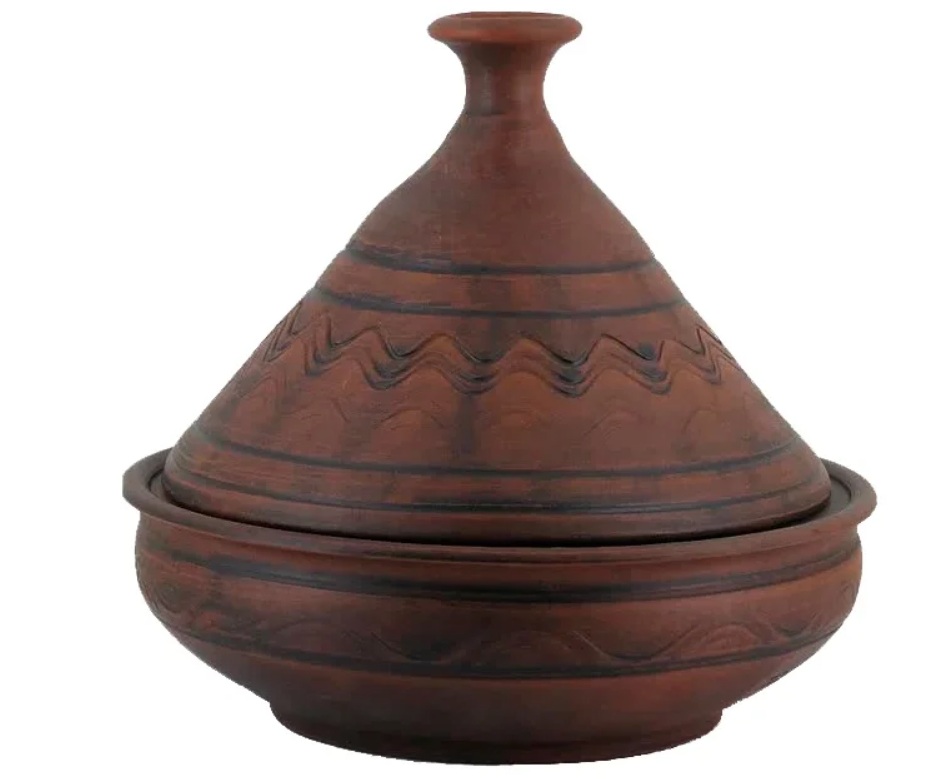
- stage of double thermal treatment at 1000 and 350 ° С;
- in the interval between treatments, the products are impregnated with milk for a pleasant color and decrease in porosity;
- to be used in Russian ovens, ovens and microwave ovens;
- made with a potter's wheel;
- the presence of a hole in the cone of the lid for bleeding steam;
- multifunctionality: can be used as a salad bowl or as a baking dish;
- diameter 24 cm - convenient for preparing several portions;
- height 26 cm;
- acceptable price.
- not dishwasher safe.
| Ceramics | |||||
|---|---|---|---|---|---|
| Emile henry | Emile henry delight | Pomi d'Oro | |||
| Diameter, cm | |||||
| bottom | 18 | 33 | - | ||
| general | 27 | 33.5 | 28 | ||
| Volume, liter | 2 | 4 | |||
| Weight, gram | 2600 | 3630 | 2376 | ||
| Height, cm | |||||
| without cover | 7.5 | - | - | ||
| with lid | 20 | 23 | 20.5 |
Cast iron tajins
This type is suitable for use with gas stoves, ovens and barbecues. Cast iron is a ferromagnetic metal, therefore such cookware can be freely used on induction cookers.
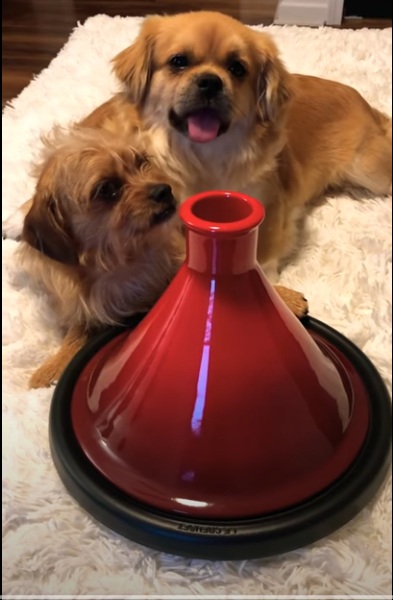
There are 2 types of cast iron tagines:
- Cast iron top and bottom;
- Cast iron and ceramic lid.
Le Creuset
The French brand dates back to 1925. This company hails from the small town of Frenois-le-Grand. Cast iron and ceramic kitchenware products of this brand have their fans all over the world.
Le Creuset is often preferred by chefs.

Among the recognized leaders in brand sales:
- Collectible sets of three-layer stainless steel.
- Ceramics.
- Non-stick types of pans.
- Enamelled cast iron cookware.
Casting
Iron casting is performed using a disposable sand mold, each of which is spaced from the next cell by 3.5 mm. After the cast-iron ebb has solidified, the original form is destroyed, so the repetition of tagines is excluded. Further, the cleaning and processing of the surfaces of the dishes takes place.
Includes:
- ½ proportion of pure cast iron.
- 15% is a mixture of minerals.
- 35% - carbon steel with iron.
Glaze
The ceramic lid coating process is immersed in a transparent glaze sealant bath to isolate from liquids and products.
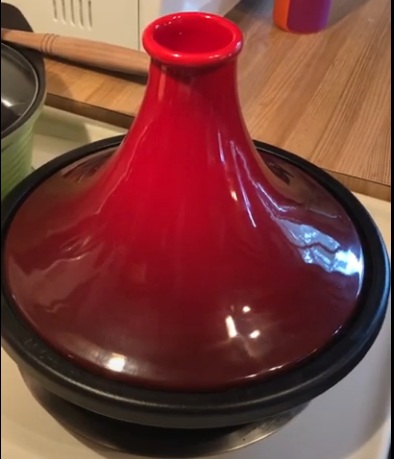
Then the procedure is repeated, but with an opaque glaze.
Tinting
Color pigment enamel is applied by spraying. To fix the layer, the lid is fired and then sanded.
Le Creuset orange 27
Moroccan dishes not only make meat or fish juicy and soft, but also fill them with oriental aromas of spices.
- suitable for all types of heating, including induction;
- suitable for pickling and storing raw foods;
- good combination of cast iron and ceramics;
- special durability of materials;
- French quality;
- fast and tasty cooking.
- cracks on the enamel are possible with strong impacts or falling.
Gipfel
The German brand with an expert class has since 1997 brought to the market tableware and cutlery in accordance with the quality of the famous German guilds.

The famous De Lux project presented to the market a series made of premium five-layer stainless steel.
Cast iron containers with ceramic lids are the perfect combination for juicy roasting and braising.
- universal diameter (30 cm);
- you can choose red, black, black and white or combined colors;
- there are models with ancient Egyptian symbols on the ceramic lid - it looks very impressive;
- unsurpassed German quality;
- the best price / quality ratio.
- not detected.
Staub
The French brand belongs to the leading manufacturers of ceramic and cast iron kitchen utensils.
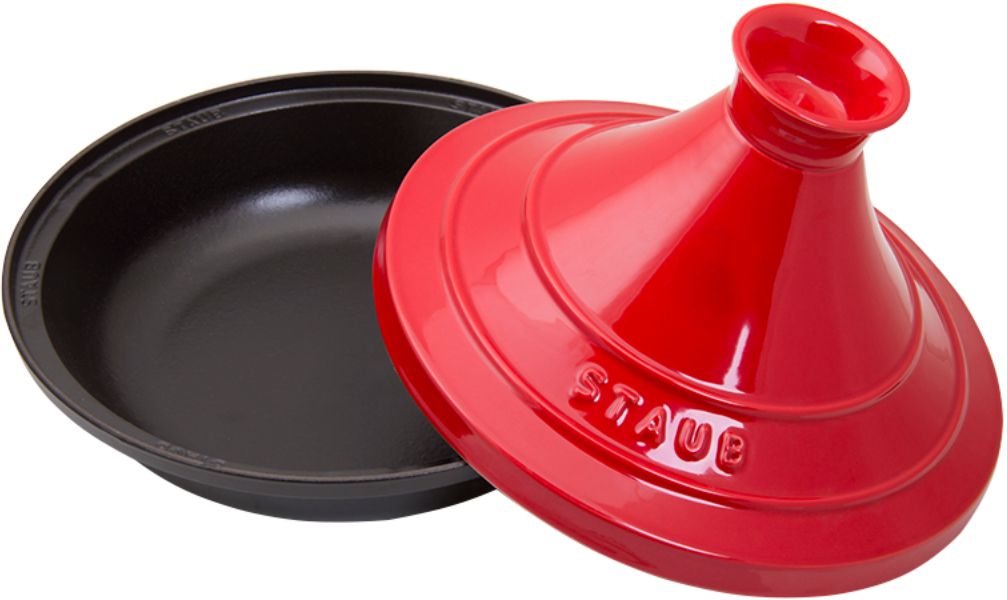
Laboratory research has made it possible to change the composition of the metal.
The cast iron version with a diameter of 28 cm is made in cream and black.
- quality and style;
- new technology and composition of the enamel coating;
- suitable for all types of heating surfaces;
- acceptable price;
- total volume - 3.5 liters.
- absent.
| Cast iron types | |||||
|---|---|---|---|---|---|
| Le Creuset orange 27 | Gipfel amey | ||||
| Diameter, cm: | |||||
| bottom | 18 | - | |||
| general | 27 | 30 | |||
| Volume, liter | 2 | ||||
| Weight, gram | 4000 | 5700 | |||
| Height, cm: | |||||
| without cover | 7 | - | |||
| with ceramic lid | 21.1 | 27 |
Stainless steel tagines
Scanpan
It is a premium Danish global brand. The company's products are distinguished by a long service life and excellent design.
The photo shows a combined version made of stainless steel and ceramics:
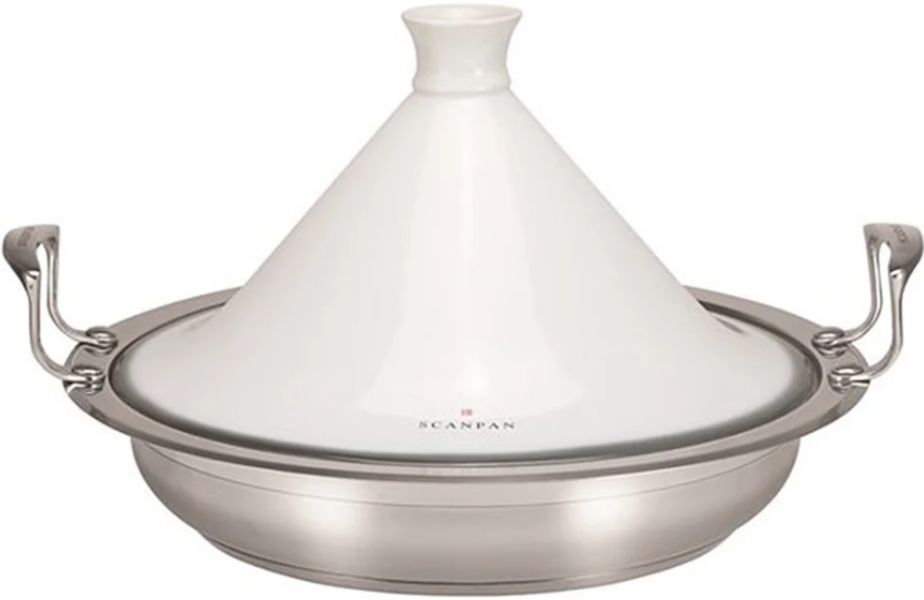
- durability and high quality;
- a unique coating that protects against chemicals;
- the latest production technologies;
- exclusive non-stick coating;
- made of stainless steel alloy with aluminum and magnetic stainless steel;
- cone-shaped ceramic glazed lid;
- suitable for use in ovens;
- can be cooked on induction cookers;
- stunning design;
- high functionality;
- dishwasher safe;
- special design of the rim without water loss during pouring;
- withstands heating up to 260 ° С.
- not identified.
VETTA
This is a good budget class cookware from a Chinese manufacturer.
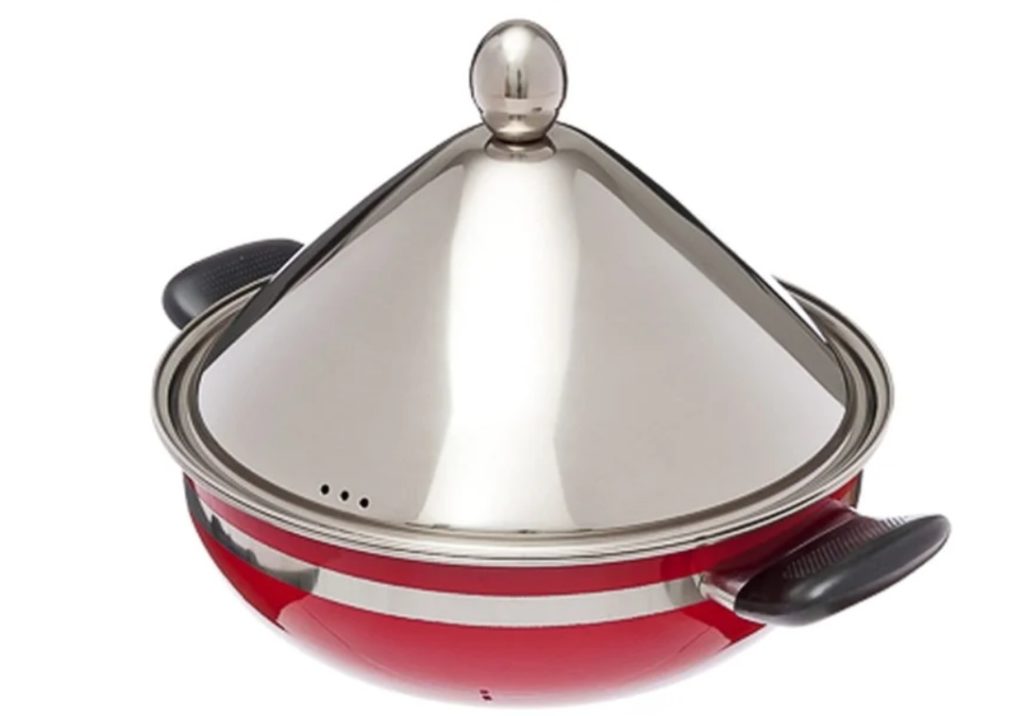
- convenient to use;
- the technology of cone steam condensation is observed;
- suitable for pre-frying and subsequent stewing;
- frying without oil in water and steam;
- great taste of ready meals.
- users report insufficient bottom thickness.
| Stainless steel | |||||
|---|---|---|---|---|---|
| Scanpan | VETTA | ||||
| Diameter, cm: | |||||
| bottom | 26.3 | 20 | |||
| general | 32 | 26 | |||
| Volume, liter | |||||
| Weight, gram | 4980 | ||||
| Height, cm: | |||||
| without cover | - | - | |||
| with ceramic lid | 24 | ||||
| Bottom, thickness, mm | 6.4 | 52 |
Berlinger haus
This famous Hungarian brand, which conquered Europe and the whole world, is now confidently expanding its sales in Russia.

Tajine is made using the latest technology from high quality materials.
- brand products are positioned for people leading a healthy lifestyle;
- combination of high quality with exquisite design;
- environmental friendliness of materials;
- safety in use;
- made of cast aluminum;
- enameled coating;
- ceramic cover;
- affordable price;
- aquamarine color.
- not identified.
Conclusion
Tajine is also the name of a Moroccan dish that is made from fish, meat, poultry or seafood.
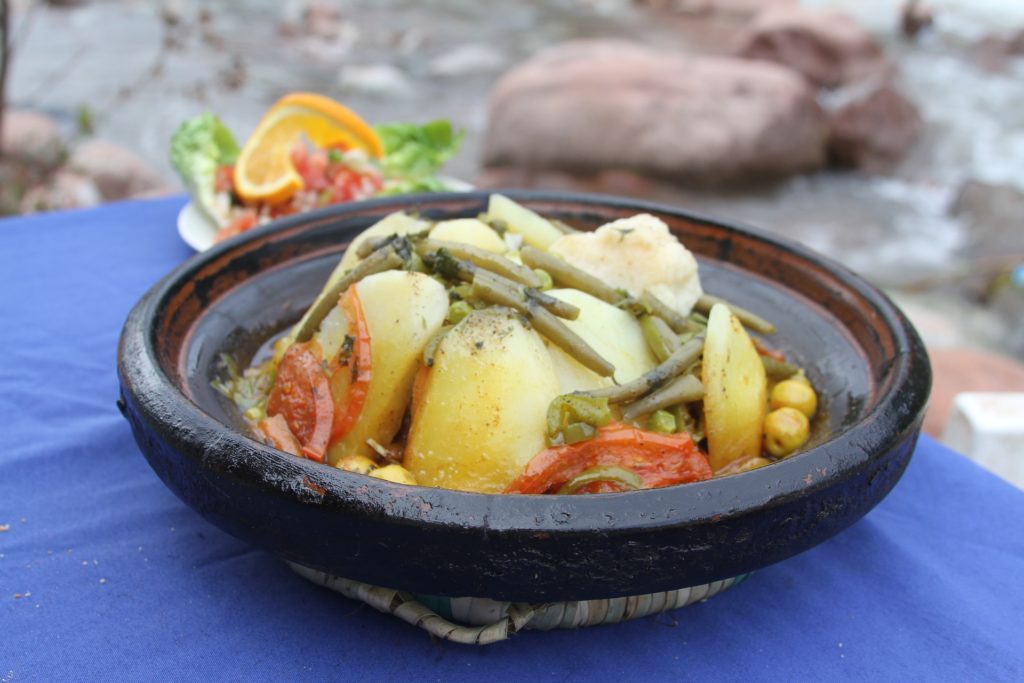
In the process of cooking, vegetables and spices are necessarily added to the tagine. After massive travels to Arab countries, many fans of this simple and aromatic national dish appeared. There is no single recipe, because real culinary art is a creative impulse, flair, taste and talent. Each family can create their own unique author's recipe, because the very shape of the tagin speaks of mystery, longevity and sophistication.
new entries
Categories
Useful
Popular articles
-

Top rating of the best and inexpensive scooters up to 50 cubic meters in 2020
Views: 97661 -

Rating of the best materials for noise insulation for an apartment in 2020
Views: 95022 -

Rating of cheap analogues of expensive medicines for flu and colds for 2020
Views: 91751 -

The best men's running shoes in 2020
Views: 87681 -

Top ranking of the best smartwatches 2020 - price-quality
Views: 85091 -

Best Complex Vitamins in 2020
Views: 84801 -

The best dye for gray hair - 2020 top ranking
Views: 82406 -

Rating of the best wood paints for interior use in 2020
Views: 77202 -

Ranking of the best action cameras from China in 2020
Views: 75269 -

Rating of the best spinning reels in 2020
Views: 74827 -

The most effective calcium supplements for adults and children in 2020
Views: 72463 -

Top rating of the best means for male potency in 2020 with a description
Views: 68296
